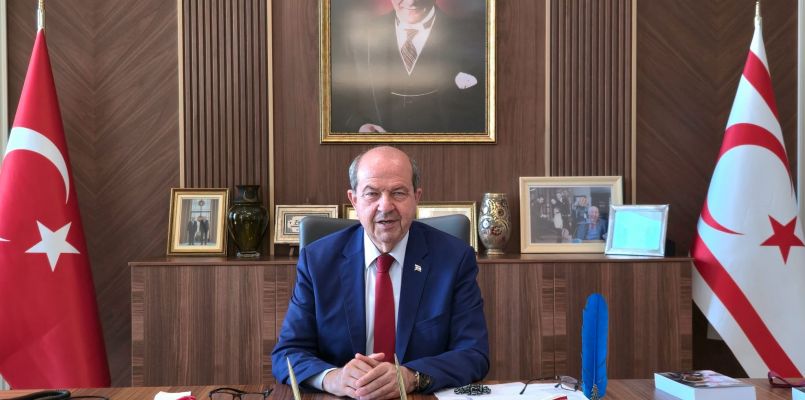President Ersin Tatar speaks to TAK news agency: "ECtHR judgement has delivered a clear warning to the Greek Cypriot leadership that is spearheading an unjust and unlawful blockade policy"

“I underline the importance of the latest judgement by the European Court of Human Rights (ECtHR) in the K.V. Mediterranean Tours Limited v. Türkiye case, where it has reaffirmed the Immovable Property Commission (IPC) as an effective domestic legal remedy. The IPC exists, functions, and provides solutions.”
President Tatar stressed that the judgement serves not only as a legal decision but also as a powerful warning against the oppressive and exclusionary policies long pursued by the Greek Cypriot leader Nikos Christodoulides and the Greek Cypriot Administration.
“This judgement illustrates how these policies have failed and lost credibility. The message is clear: It is not possible to reach a solution by ignoring the Turkish Cypriot side and placing our people under a blockade,” the President said.
Reiterating his call to the Turkish Cypriot People for “unity” and a “single voice with regards to immovable property,” President Tatar said: “The IPC reflects our people’s trust in our own legal system. The Turkish Cypriot people, who are self-reliant and standing on their own feet, is what is most unsettling for the Greek Cypriot leadership.”
President Tatar noted that the ECtHR, in its June 10, 2025 judgement, reaffirmed the legitimacy of the IPC as an effective legal mechanism. “This decision in actual fact reaffirms the righteousness of our long-standing legal and political struggle. This is not the first such judgement by the ECtHR, which has endorsed the IPC’s existence, functionality and jurisdiction. It has been consistently upheld by the ECtHR. What is however new in this judgement, is that the Greek Cypriot side’s efforts to ignore this legal body have once again been rejected at the international level.”
The President added: “The Court also confirmed that restitution is not the only form of redress, and that compensation and exchange are valid alternatives to providing effective legal remedy, which is indeed crucial. The Greek Cypriot side has long presented ‘absolute restitution’ as a sacred, non-negotiable right. This judgement has, however, once again clearly and unambiguously demonstrated that this narrative is no longer valid.”
“The ECtHR has once again acknowledged that the remedies provided by IPC for restitution, compensation, and property exchange, are all effective legal remedies compatible with human rights. Fair and reasonable approaches—and certainly not one-sided and unlawful expectations—is the correct approach that should be taken on the property issue. This ruling further reinforces the credibility and legitimacy of the IPC,” the President said.
Addressing references in the judgement to certain delays, President Tatar said the ECtHR took a fair and balanced position. “The ECtHR noted that some of the delays were caused by the applicant, and also pointed to the need for improvements in our institutions to accelerate the process. This is both a positive outcome and an opportunity for us. The IPC is already a dynamic body, and we will do our best to make its processes more transparent, efficient, and swift. Crucially, emphasis has been made by the ECtHR that there has been no violation of the fair trial principle, and it reaffirmed that the IPC operates in line with international legal standards.”
President Tatar also stressed that the judgement of the ECtHR’s accepted the Vakıflar (Religious Foundations Administration) as an intervening party in relation to properties in the closed-part of Maraş. “This is indeed one of the most striking aspects of this judgement,” President Tatar said, adding: “The Court found the historical property claims by Vakıflar — particularly regarding Maraş - to be legitimate and consistent with the principal of fair trial. This reaffirms what we have defended for years through archival evidence and title deeds: Vakıf properties cannot be ignored under international law.”
He also pointed out that the Court rejected the Greek Cypriot claim that the involvement of TRNC High Administrative Court judges in IPC-related cases created conflicts of interest. “The ECtHR explicitly ruled that this does not compromise impartiality. This reflects international trust in the independence and institutional integrity of the TRNC judiciary,” President Tatar said.
When asked how he expects the Greek Cypriot leadership to respond, President Tatar stated: “Mr. Christodoulides and the administration he is leading have long used the language of human rights and international law as political tools against the Turkish Cypriot people. This ruling clearly shows that such strategies have collapsed and lost credibility. This is not just a court decision; it is a clear warning: A solution cannot be achieved by ignoring the Turkish Cypriot People or placing them under a blockade.”
The Greek Cypriot strategy to bring Turkish Cypriots under blockade is not limited to blocking direct flights, direct trade and direct contacts. It also aims to exclude our people from the international system through the property issue. This ruling exposes the legal invalidity of that multi-layered Greek Cypriot leadership’s strategy that is systematically trying to place Turkish Cypriots under siege. We raise this issue at every opportunity, including with UN Secretary-General Antonio Guterres and international actors that we have contacts with. This is not just about property rights—it concerns fundamental human rights, the recognition of our will, existence and future.”
President Tatar, in conclusion of his assessment of the recent ECtHR judgement, said: “I once again call on everybody, regardless of political views, to unite. The IPC represents our confidence in our own legal system. This decision proves that the most powerful response to exclusionary and hostile policies lies in strengthening our own institutions. We must protect and empower these structures and foster solidarity within.
A self-reliant Turkish Cypriot people is what most threatens and unsettles the Greek Cypriot leadership. That is why they target our economy and institutions—because our self-sufficiency disrupts their agenda. But we will persevere. Our struggle against injustice will continue.
Our vision for a settlement is clear: Two separate peoples, two separate democracies, and two sovereign States exist on the Island of Cyprus. This is a historical, geographical, political, and legal fact.
Any future settlement must be based on sovereign equality and equal international status.
The Turkish Cypriot people no longer believe in the myth of a federal solution. Why? Because decades of federal negotiations have been exhausted and brought us nothing, but served only as a means of providing a comfort zone for the Greek Cypriot side, that has usurped our rights and acquired a status through force of arms at our expense. Therefore, we now advocate for a realistic and sustainable basis for a settlement in Cyprus that protects the honour of the Turkish Cypriot People.
Despite what is believed, the two State position is increasingly resonating internationally. Formal recognition may take time, however the real issue is that the Turkish Cypriot People show determination and continue the path that compels the other side to accept the factual realities on the ground.”

